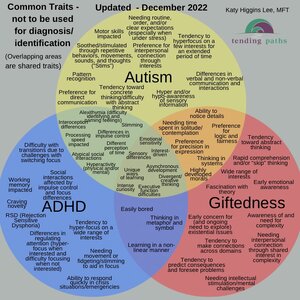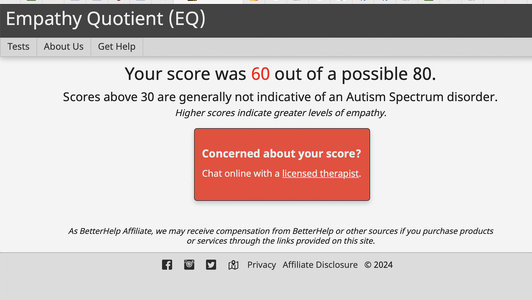- Joined
- Jun 8, 2008
- Messages
- 54,238
OK so I hope this will not offend anyone or be a sensitive topic but if you feel it might be please do not continue reading. I have zero wish to offend anyone. The topic is autism. So please 1. forgive me if I get something wrong and 2. know I am not making light of this. I know for those who are dealing with this in force it is challenging and I am absolutely not dismissing it nor do I think it is a diagnosis to be made by a lay person. But in the spirit of PS I would like to chat about it and learn if I can from others. So if you do not mind indulging me I appreciate it and ask you to please not be offended. But if you think you might be please do not continue reading...thank you
My dh has been saying for a long time now he feels I am "on the spectrum"
I always laughed it off because I worked with those who were autistic for most of my career.
Most of my patients were severely autistic (though some were more mildy affected) so maybe not a fair comparison.
And I was always social to a degree (when I was younger) though to be accurate I always classified myself as an extroverted introvert. Meaning I am introverted but can fake being extroverted when necessary.
Greg thinks I am on the spectrum because...
I hate change/deviation from schedule
Obsession with routine
I don't like most people
Certain textures bother me greatly (corduroy and wool as two examples)
Loud noises bother me
I eat the same foods over and over and I do not like many foods
I have intense interests and like sameness
I hate small talk
I avoid large groups and parties-not a fan
I am quick to anger but also very quick to forgive
I have trouble focusing sometimes and get lost in my thoughts often to the point where I might be watching something on TV but somehow lost 20 minutes and no clue what happened despite watching
Same for reading a book now too
And last one for now...newer research suggests that some autistic people may actually feel other people's emotions more intensely
and I feel others emotions overwhelmingly intensely to the point I feel the actual pain
Why I do not think I am on the spectrum:
I am very intuitive and can immediately know what one is thinking and feeling
I always make eye contact
I do not have low level repetitive movements
(Though I do have repetitive behaviors such as needing routine and structure)
I respond well to non verbal cues and can read people
I do well though one on one and do enjoy that kind of social interaction to a degree
I can adapt to change (but dislike it)
I was the number one student in all my schools including college and graduate school where I took top honors for both clinic and academics. I do not know if that means anything and perhaps not. As I know there are high functioning people on the spectrum. But that high functioning?
OK so looking at my lists I see the autistic traits outweigh the neurotypical traits I have
But as with everything there is a scale so maybe I am somewhat on the spectrum. But maybe not.
I resisted for a long time but I do see his points and just as with everything including sexuality there is a range where one falls.
What about you?
I think we have some PSers who are "on the spectrum" but I cannot remember who.
Do you think you could be on the spectrum or is that over diagnosed now because it is currently the "popular" diagnosis ?
Or are these (my) traits common ones nowadays with technology changing our brain waves to the point we experience some of these "autistic" behaviors?
Some of my traits I had always (hating change and obsession with routines; extreme dislike of certain textures and smells; extreme emotions and empathy to the max; very picky about food)) but some are relatively newly (past few decades) developed like hating parties (so much) and many (most ?) people and avoidance of crowds in general. And maybe I have become more obsessed with routines and being very regimented in general though I was always strict that way but perhaps more so now.
Curious to hear your thoughts and see where you think you are on this spectrum.
Thank you for reading and for sharing if you are up to it
My dh has been saying for a long time now he feels I am "on the spectrum"
I always laughed it off because I worked with those who were autistic for most of my career.
Most of my patients were severely autistic (though some were more mildy affected) so maybe not a fair comparison.
And I was always social to a degree (when I was younger) though to be accurate I always classified myself as an extroverted introvert. Meaning I am introverted but can fake being extroverted when necessary.
Greg thinks I am on the spectrum because...
I hate change/deviation from schedule
Obsession with routine
I don't like most people
Certain textures bother me greatly (corduroy and wool as two examples)
Loud noises bother me
I eat the same foods over and over and I do not like many foods
I have intense interests and like sameness
I hate small talk
I avoid large groups and parties-not a fan
I am quick to anger but also very quick to forgive
I have trouble focusing sometimes and get lost in my thoughts often to the point where I might be watching something on TV but somehow lost 20 minutes and no clue what happened despite watching
Same for reading a book now too
And last one for now...newer research suggests that some autistic people may actually feel other people's emotions more intensely
and I feel others emotions overwhelmingly intensely to the point I feel the actual pain
Why I do not think I am on the spectrum:
I am very intuitive and can immediately know what one is thinking and feeling
I always make eye contact
I do not have low level repetitive movements
(Though I do have repetitive behaviors such as needing routine and structure)
I respond well to non verbal cues and can read people
I do well though one on one and do enjoy that kind of social interaction to a degree
I can adapt to change (but dislike it)
I was the number one student in all my schools including college and graduate school where I took top honors for both clinic and academics. I do not know if that means anything and perhaps not. As I know there are high functioning people on the spectrum. But that high functioning?
OK so looking at my lists I see the autistic traits outweigh the neurotypical traits I have
But as with everything there is a scale so maybe I am somewhat on the spectrum. But maybe not.
I resisted for a long time but I do see his points and just as with everything including sexuality there is a range where one falls.
What about you?
I think we have some PSers who are "on the spectrum" but I cannot remember who.
Do you think you could be on the spectrum or is that over diagnosed now because it is currently the "popular" diagnosis ?
Or are these (my) traits common ones nowadays with technology changing our brain waves to the point we experience some of these "autistic" behaviors?
Some of my traits I had always (hating change and obsession with routines; extreme dislike of certain textures and smells; extreme emotions and empathy to the max; very picky about food)) but some are relatively newly (past few decades) developed like hating parties (so much) and many (most ?) people and avoidance of crowds in general. And maybe I have become more obsessed with routines and being very regimented in general though I was always strict that way but perhaps more so now.
Curious to hear your thoughts and see where you think you are on this spectrum.
Thank you for reading and for sharing if you are up to it
Last edited:






300x240.png)